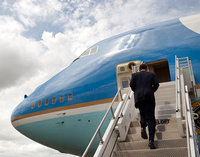If President Barack Obama's handling of the events in Libya exemplifies his own definition of a "post-American world," then we have moved past a G-Zero reality, which is how Nouriel Roubini and Ian Bremmer described a G-20 that can't agree on how to rebalance global power, and into what I would describe as the "G-Less-Than-Zero" world, where America purposefully abdicates its global leadership role.
A realist reading would present Obama as having committed himself to economic renewal at home while contenting himself with just nudging events abroad. Indeed, that's basically what the buried headline of his 2010 National Security Strategy -- "building at home, shaping abroad" -- translates to. There's a genuine attractiveness to this strategic impulse. The major players in the system -- Europe, Russia, India, China and Brazil, among others -- are all fairly set in their trajectories right now, so it's not necessarily a bad thing if America pulls back to let the "rest" realize what it's like to manage the world on their own. By this logic, we start by accepting that America is slated for a certain "healing" withdrawal from the world, then we pin our hopes on renewal.
Obama's right-wing critics, of course, frame this same restraint as hostility toward the use of American hard power overseas. But even if you don't buy into that interpretation, Obama's past criticism of George W. Bush's unilateralism now has him handcuffed on the subject of Libya, as Rush Limbaugh recently argued.

